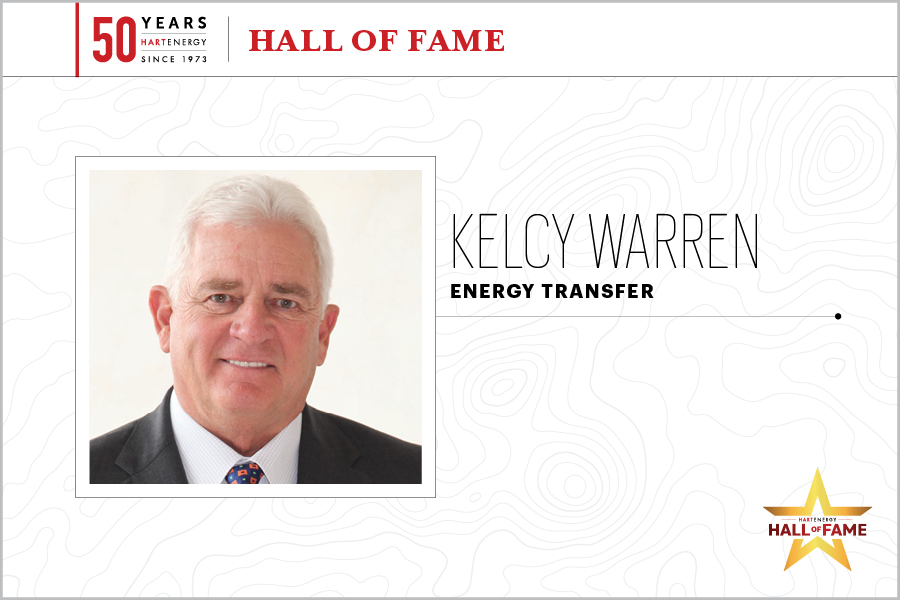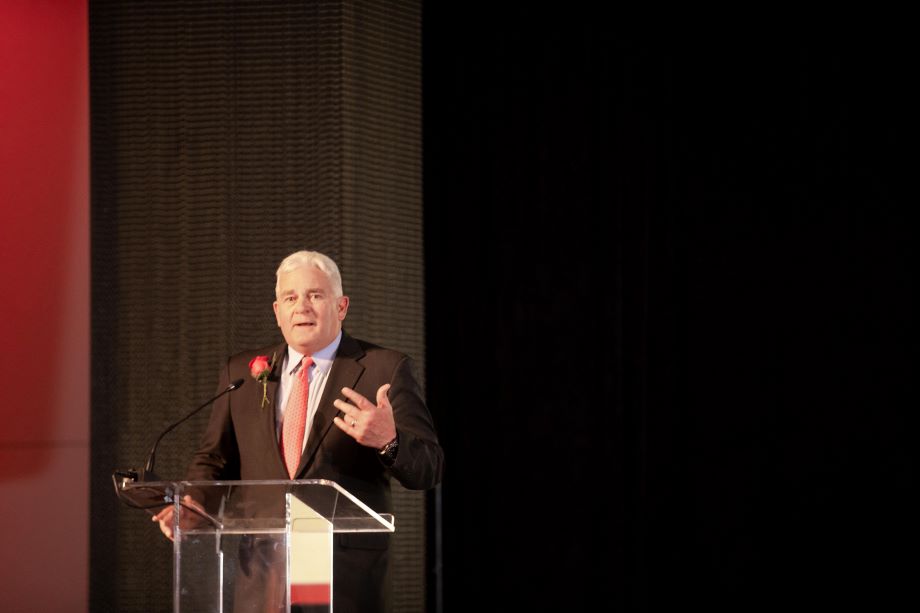Kelcy Warren
Editor's note: This profile is part of Hart Energy's 50th anniversary Hall of Fame series honoring industry pioneers of the past 50 years and the Agents of Change (ACEs) who are leading the energy sector into the future.

Kelcy Warren, the Energy Transfer co-founder and executive chairman, built a pipeline empire in less than three decades that he is still growing ever larger with each new deal.
But, arguably, no moment felt more meaningful than the 2012 acquisition of Sunoco—a company where Warren’s father spent his career as a pipeline field hand and considered it “his company.” His father died in 1992.
“I wish my dad would’ve been around to see that,” Warren told Hart Energy. “It was just emotional for me. I mean, I couldn’t believe it. I remember the day that it closed. In my prayers, I talked to my dad about it.
“So, it was just unbelievably rewarding. It’s never the reason a business person should ever do an acquisition. If it has sentimental value to you, then never, ever,” he said. “But, in this case, yeah, it had that, but it was also a fabulous acquisition for our unitholders. But it was a big deal. Big deal for me.”
The point is that Energy Transfer isn’t just a business for Warren; being a leading pipeliner is a way of life instilled in him by his family.
Energy Transfer’s explosive growth has involved a lot of organic growth, such as the well-known Dakota Access Pipeline, but much of the expansions have come through acquisitions, and primarily through two big waves. First, from lots of pipeline assets put on sale in the years after the Enron collapse as other companies struggled. Then, again, in recent years, as Energy Transfer helped lead midstream consolidation amid growing pipeline capacity demand from rising crude oil and LNG exports.
But it all started back in the rural East Texas area of Gladewater and White Oak, where Warren was born and raised.
Oil and gas roots
Warren started out taking the best job offer he had after graduating the University of Texas at Arlington with the Lone Star Gas Co. He eventually moved on to the pipeline and refining company, Endevco.
Endevco fell into financial troubles and Warren was tasked with helping to find a buyer for the company. During that process, he met investors Ray C. Davis and Ben Cook. Warren ended up teaming with them to buy Endevco, rebrand it and sell it again for a bigger profit.
They used much of the proceeds to found Energy Transfer in 1996 with about 200 miles of East Texas natural gas pipelines.
Early on, Davis—now owner of the Texas Rangers baseball team—focused on the business side of things, while Warren was the visionary leader thinking longer term and imagining the continent’s largest network of pipelines and export hubs.
“Kelcy doesn’t think like other people. He sees possibilities where others don’t,” Davis said in a previous interview with the Houston Chronicle.
Warren credits a combination of “pure luck,” necessity and business foresight and acumen for the success. Early opportunities arose in the 2000s. “Enron was a gift from God, and we took advantage of that.”
“Because of the Enron collapse, many assets that would’ve never been for sale came on the market very quickly,” Warren said. “There was a dumping of assets because, people forget, it wasn’t just Enron that had this business plan. There were a lot of Enron wannabes that had copied their plan and were doing a very similar type of approach to business.”
They acquired much of Aquila Inc., the TUFCO System, Houston Pipeline System, Transwestern Pipeline and more, building out a natural gas pipeline network.
Then, natural gas prices tanked and Warren realized Energy Transfer needed to diversify out of necessity. The company grew in the NGL space by acquiring Louis Dreyfus Highbridge Energy after another bid fell through.
Warren next had his eye on the crude oil sector. He was in New York when he got a call saying that Sunoco might be looking to sell. He flew to Philadelphia within a few hours to help set up a deal, which turned out to be valued at $5.3 billion. “I couldn’t believe I was doing it,” he said. “I was like, ‘This is just too good to be true.’”

After several years of more organic growth and lots of fractionation construction, Energy Transfer again aimed to consolidate the midstream sector. In 2014 came Susser Holdings, followed shortly by Regency Energy Partners, PennTex Midstream Partners, USA Compression Partners and SemGroup.
In the last two years or so, Energy Transfer has scooped up Enable Midstream, Lotus Midstream and, most recently for $7.1 billion, Crestwood Equity Partners, the latter of which bolsters its large footprints in the Permian Basin and Bakken Shale, while also expanding Energy Transfer into the emerging Powder River Basin.
“They are very compatible,” Warren said of Crestwood’s connectivity to Energy Transfer, minus some connecting of the dots with planned capital construction.
“I’d like to tell you that we saw everything in advance and we’re smarter than everybody else, but that’s just not true,” Warren said. “We’ve been very reactive here, but I think our reactions have been pretty good.”
Next, Warren sees Energy Transfer continuing to serve as an industry consolidator, but he also wants to expand more internationally throughout North and South America, while also growing more into the LNG and petrochemical industries.
“There’s fewer and fewer—one by one we’re checking ’em off,” Warren said. “But there’s still some really good assets out there that we’ve got our eyes on that we think fit us really, really well.”
“We always try to make our machine more efficient,” he added. “If you’re a good pipeliner, you’ll never have the perfect system.”
—Jordan Blum, Editorial Director
